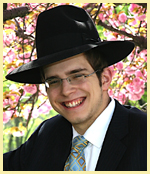Always on the clock
[Editor’s note: As a memory of my beloved brother Shaya, I would like to continue sending out his pearls of wisdom that he has shared with all of you in the past. For some of you this may ring a bell and for others it may appear to be totally new. May the learning of Shaya’s Divrei Torah inspire us to change our ways and thereby give an Aliya to the neshama of our dear beloved Shaya whom we miss so much. A special thank you to Aaron Friedman for always looking over the divrei torah.]
Parshas Tetzaveh describes the special garments that Ahron Hakohen and his sons would wear while serving Hashem in the Mishkan and Beis Hamikdash. On the hem of the Kohein Gadol’s turquoise robe were golden bells that jingled as he walked. The Ramban explains that the reason the Kohen Gadol’s bells rang was to announce his presence to Hashem. Rav Michael Bernstein adds that it would also impress upon the Kohein Gadol to act with the proper respect and holiness in Hashem’s presence.
We can understand why the Kohein Gadol must wear this robe while he is in the sanctuary, but the Torah adds that he must wear it outside the sanctuary as well. Why?
Perhaps we can infer from here a fundamental lesson that we can apply to our daily lives. Yes, it’s very important to treat a Shul and Beis Medrash with holiness by davening and learning there, but when we leave it, we are still “on the clock.” Judaism does not merely emphasize the performance of mitzvos; rather, it is about keeping Hashem in mind at all times, and trying to elevate EVERYTHING we do. Whether it be our eating, exercising, sleeping, or reading, the underlying purpose of our actions must be for Hashem’s sake. If we have these proper intentions, Hashem will have much nachas, and will reward us.
We can now understand the need for the Kohein Gadol to wear the robe outside of the sanctuary. The Torah is stressing the point that regardless of the Kohein Gadol’s location, Hashem’s presence should be felt everywhere.
May we all always keep this fundamental principle in mind, that we are always “on the clock,” and that even our “mundane” actions can be elevated and incorporated into Avodas Hashem. |





